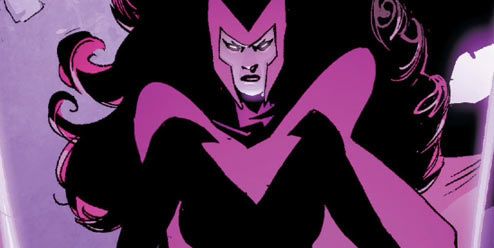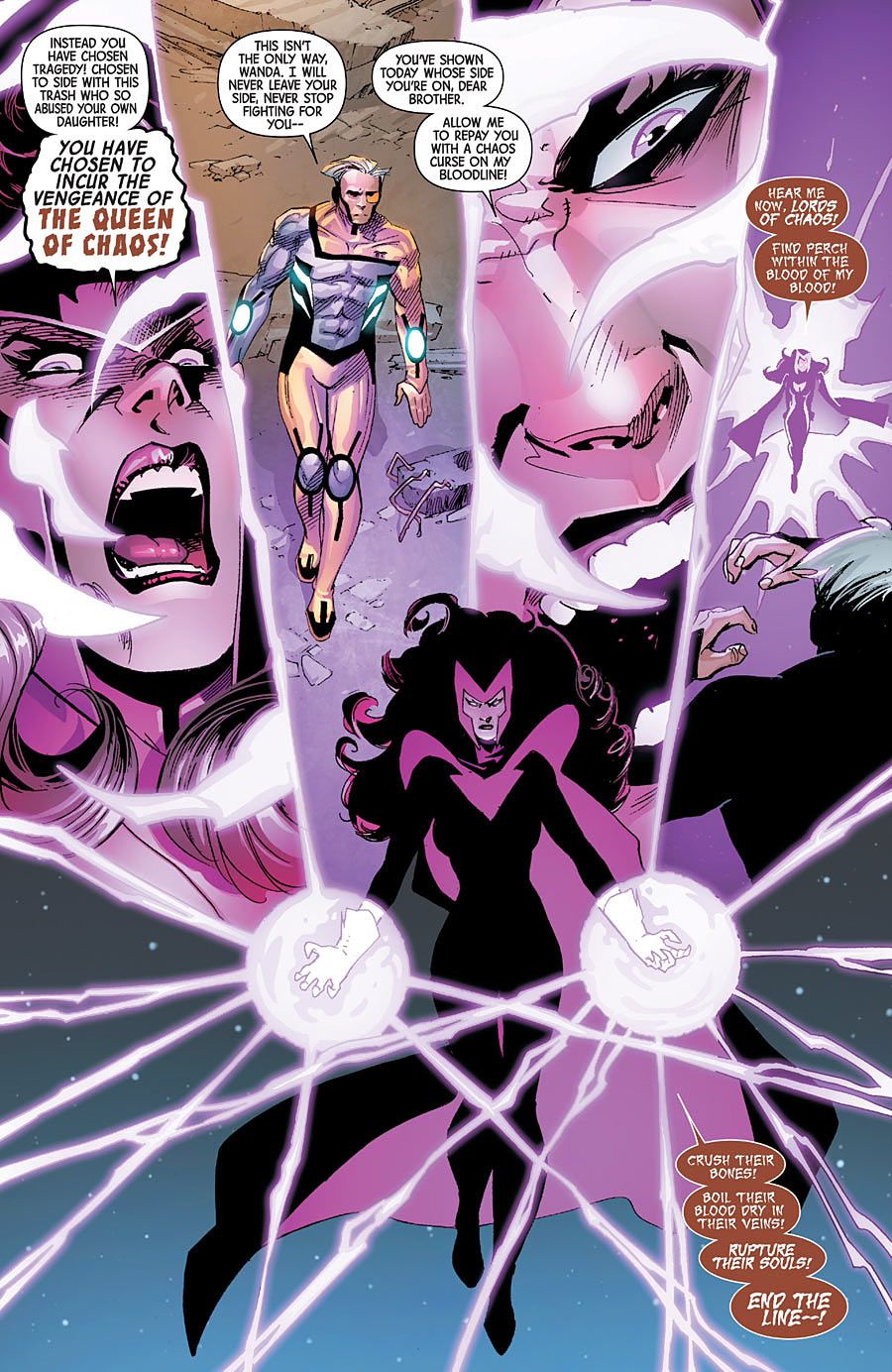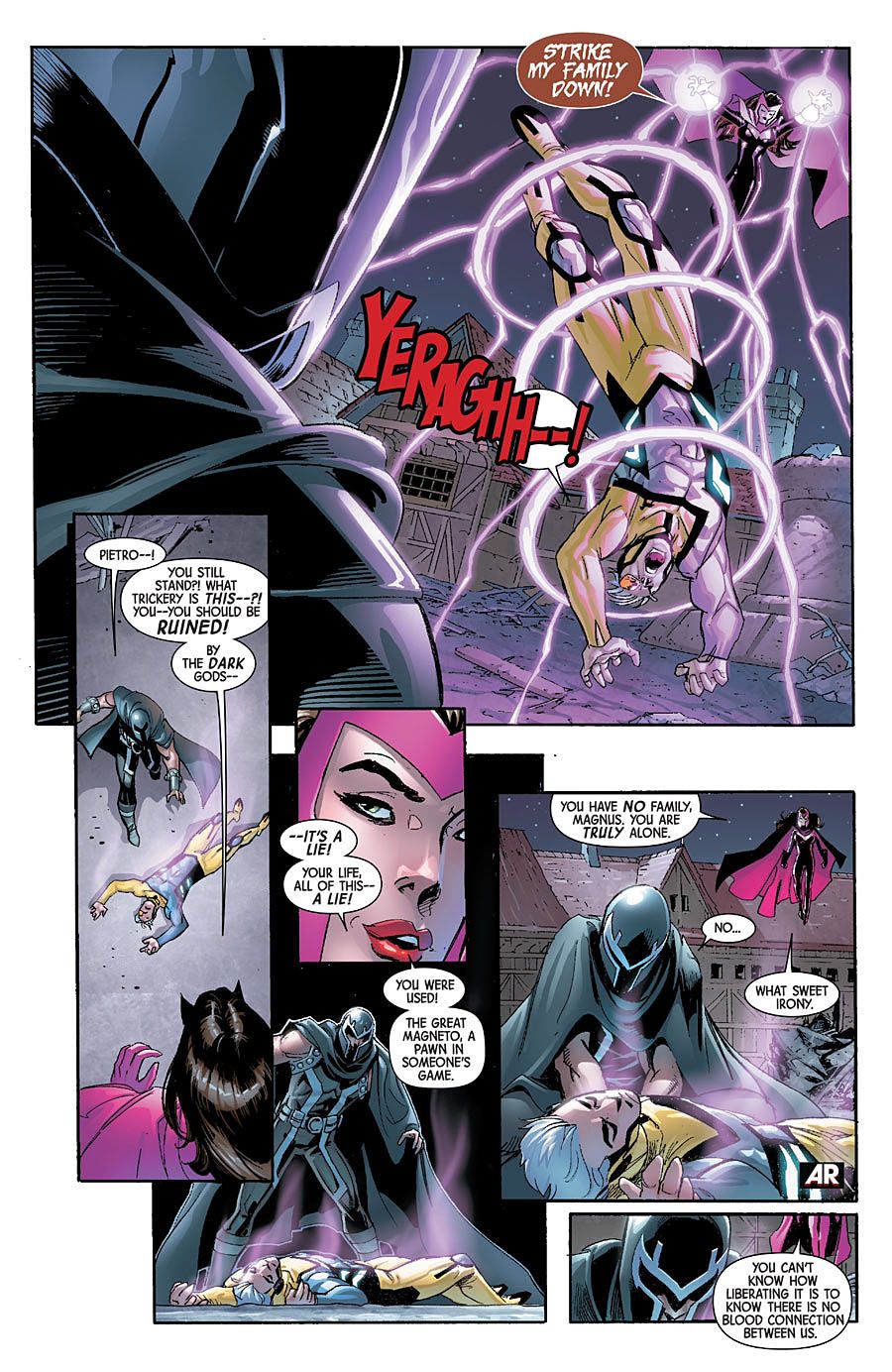If you've read "Avengers and X-Men: AXIS" #7, then you know that a fairly major part of Marvel Comics continuity has been altered. While it's a change that comes as a surprise because of how major it is, it's also one that everyone should have seen coming. With a spoiler warning now given for "AXIS," "Original Sin" and the "Agents of S.H.I.E.L.D." midseason finale, we'll get into what happened in the latest issue of Marvel's latest crossover. After Scarlet Witch cast a spell designed to hurt all of those in her bloodline, it was revealed that she and her brother Quicksilver are not linked to Magneto by blood. This development alters continuity that has been in place for almost 32 years -- and it does so just in time for the twins to make their Marvel Cinematic Universe debut in "Avengers: Age of Ultron" as characters that, due to rights issues, can be neither mutants nor Magneto's children.
This revelation may be a red herring, and there may be a greater in-story reason for the change, but Marvel's recent history does not indicate that is will be the case. Marvel's actions since their purchase by Disney in 2009, and the transformation of their films into juggernaut blockbusters with 2012's "Marvel's The Avengers" indicate that the change is the latest in a long line of retcons and alterations undertaken to remake the 75-year-old continuity so that it is more in-line with the young and massively popular -- yet comparatively fractured -- Marvel Cinematic Universe.
ALL AXIS PASS: Brevoort on "AXIS" #7's Big Revelation, New York Battle
We should have all seen this change in the Maximoff twins' parentage coming when director Joss Whedon pegged them for inclusion in "Age of Ultron" in April 2013. Why? Well, the original Nick Fury has been replaced by his son, a man that looks a lot like Samuel L. Jackson. Original MCU creation Phil Coulson debuted alongside Nick Fury Jr. and has since become a Marvel Comics mainstay. "Original Sin" revealed Dum Dum Dugan to be an LMD, killing him off just in time for characters from ABC's "Agents of S.H.I.E.L.D." to make their debut in a new "S.H.I.E.L.D." ongoing. With Marvel's mutants effectively owned by Fox, Marvel dropped a Terrigen bomb on its comic-based Earth, thus spawning new Inhumans all over the planet and creating a mutant-like subspecies; a similar development just occurred on "Agents of S.H.I.E.L.D.'s" midseason finale. The much-touted Avengers NOW! lineup consists of movie leads (Winter Soldier, Ant-Man, Doctor Strange), upcoming MCU additions (Scarlet Witch), breakout MCU stars (Falcon as Captain America) and Inhumans (Medusa, Dante). "Disney Infinity: Marvel Super Heroes" includes every Marvel superhero -- except for the Fantastic Four and X-Men.
No matter what in-story explanation they give, and no matter how great a story it may be, the continuity that connects Magneto, Scarlet Witch and Quicksilver appears to have been changed in order to preemptively reflect how those characters will be portrayed in "Avengers: Age of Ultron."
To play Devil's Advocate for a second: This should be expected. This move makes sense. Of course Marvel wants to change their comics to reflect their films. The potential flow of dollars does not trickle from the comics to the movies. Marvel Studios and Disney know that comic book fans are going to see these movies pretty much no matter what and, considering how relatively minuscule the comic book buying audience is compared to the movie going audience, they have no reason to cater to the smaller group. The hope is, of course, to create new comic book fans from those moviegoers, and to make that transition easy by giving them more of the same MCU-style action when they get to the comics.
These are just stories. This is just fiction. Whatever corporate-mandated synergy is handed down to comic creators to fulfill does not change the authorial intent behind the last 75 years of stories. Dum Dum Dugan is still the real Dum Dum in all those stories you love, and Magneto is still Pietro and Wanda's father in your favorite back issues. With continuity shifting as much as it does nowadays, it helps to take a pick-and-choose mentality toward it and, if need be, be willing to sever ties with stories if they start confounding you more than they entertain.
Devil's Advocacy aside, there is also a solid argument to be made that these changes undermine one of Marvel's greatest asset -- its unbroken and rich history, and add needlessly impenetrable complications to characters that will make them off-putting and confusing to any new reader that decides to look at any of the comics published prior to 2008. The Marvel Universe is home to some of the greatest serialized fiction in the history of mankind. Yeah, I believe that. There's a reason the movies have done so well for their companies; that's because they are rooted in the great work of Stan Lee, Jack Kirby, Steve Ditko, Chris Claremont, John Byrne, Louise Simonson, Walt Simonson, Roy Thomas, Ed Brubaker, Brian Bendis, Matt Fraction -- the list goes on and on, because the best creators have been able to do some of their best work for the House of Ideas, and many still do. These movies work on the big screen because of the special Marvel magic that has been built over the course of decades, not in spite of it.
The forced synergy we've seen between the comics and movies feels counter to the incredibly progressive and brilliant work currently being done on the vast majority of Marvel's titles, books like "Thor" and "Daredevil," because this synergy doesn't feel story driven. We know why it's being done. We know why Malekith showed up in the pages of "Thor: God of Thunder" around the same time he appeared in "Thor: The Dark World." We know that the comics and movies have to have a relationship, but that relationship is not innately beneficial.
To illustrate the difference, look at the "Infinity" and "Inhumanity" events from last year. Those two storylines set the stage for Marvel's Inhuman makeover, a move that we can now see unfolding in a similar fashion on "Agents of S.H.I.E.L.D." most likely in preparation for Quicksilver and Scarlet Witch's reveal as Inhumans -- not mutants -- in "Age of Ultron" and the group's feature film in 2018. And here's where synergy gets tricky. While those events have not struck a chord with readers for the most part, without them, we might not have "Ms. Marvel," a book that is going to be on a lot of best-of lists this year because of its honest and imaginative portrayal of a new teen superhero. This book feels real and beautifully raw because it so obviously comes straight from the life experiences of editor Sana Amanat and writer G. Willow Wilson. Readers have responded to it and championed it, and that series has gone on to unprecedented digital success. Great things can come from synergy, but it has to feel natural. The adventures of Kamala Khan do not feel forced; quietly replacing mutants with Inhumans due to issues over movie rights, does.
These synergistic changes may be designed to ease new readers into the world of Marvel, but it seems hard to believe that giving the Maximoffs a third set of parents after revealing two of them to be impostors is easier to understand and follow than just having Magneto be their father in the comics and not in the film. These are adaptations, after all, not literal and strict translations. To force one to look exactly like the other negates the point of both of their existences. The bigger the differences between the two, the easier it may be for newcomers to differentiate the two. If the characters dress the same as their film counterparts (Star-Lord) and have all the same relationships (Iron Man and Hulk), then won't that make these comics seem like canon MCU comics to new readers? And then, won't the smaller discrepancies -- Hawkeye's hearing loss, Black Widow's age -- stand out even more? Where does Disney draw the line regarding which differences need to change? It seems like incoming readers would have an easier time telling the difference between, say, a green MU and red MCU than ones colored turquoise and teal.
What "Marvel's Agents of SHIELD's" Winter Finale Means for the MCU
Right now, it feels like Marvel is trying to have it both ways, trying to cater to new fans by remaking the MU in the MCU's image, which means they're also trying to cater to Disney -- the massive entity that purchased the company because of it's character library and has seen great success with it on the big screen. It's also catering to hardcore comic book fans by publishing some of the most artistically inventive superhero comics on the shelves today. This is the company that gave us a nearly all LGBT team in Kieron Gillen and Jamie McKelvie's "Young Avengers." This is the company that let Fraction, David Aja and Annie Wu do "Hawkeye" on their own terms. Marvel Comics gave Dan Slott and Mike Allred "Silver Surfer" and said "Go nuts!" This is why these efforts to shoehorn elements from the films into the comics feel disheartening.
With this sort of change, Marvel feels predictable. No, we can't predict everything. I can come up with a dozen things I never could have predicted ("All-New Captain America," the new "Thor," "Ms. Marvel," a solo "Storm" series, etc.). But there's plenty of things we could see coming: The rise of the Inhumans to serve as a mutant placeholder, an "Ant-Man" ongoing in advance of his movie coming out, Sam Wilson's rise to prominence and a new Winter Soldier series following "Captain America 2," the expansion of the Guardians line with the film's simultaneous release and domination, the return of Malekith in "God of Thunder," the arrival of "Agents of S.H.I.E.L.D." in their own comic series, etc. And there are even more predictions we can make: Doctor Strange and Black Panther will get an ongoings at some point in 2015, Quake will probably appear in a main Avengers book in the next few months now that she's on "S.H.I.E.L.D.," Steve Rogers will become Captain America again in time for "Captain America: Civil War," similar to how he took over the role from Bucky in time for 2011's "Captain America: The First Avenger"; Falcon will get a high-profile ongoing series after that. Whereas we used to have no real idea about where Marvel was going, it's now possible to predict where the comics are going based on the changes and announcements made about the MCU. No, maybe we shouldn't speculate, but after so many instances of synergy, speculation about the comics has become an instinctual reaction to movie news.
It's the enthusiasm of the MCU fans that has driven DC and Warner Bros. to follow in Marvel's footsteps, albeit wearing heavy Doc Martens as opposed to Marvel's fun sneakers. But how much longer can this enthusiasm last? Tastes change. People that love Marvel movies now don't have to love them forever. With at least six big budget superhero films coming out each year for the foreseeable future from the big four studios (Marvel, WB, Fox and Sony) and a never-ending number of TV shows on the air or announced ("SHIELD," "Flash," "Arrow," "Walking Dead," "Constantine," "Gotham," "iZombie," "Agent Carter," "Daredevil," "Luke Cage," "Iron Fist," "Jessica Jones," "Defenders," "Titans," "Supergirl," "Krypton," "Preacher," "Powers," etc.), how long can this level of mainstream interest be maintained? Nothing is guaranteed in pop culture. Everything has a shelf life. Critics were decrying the seeming abundance of superhero films before the Marvel revolution happened in 2008. Now that stretch of time between "Blade" and "Iron Man" can be seen as the opening act for the real age of comic book dominance. But when does this age end? And what's next? And what will be left standing when Marvel has its first flop? When this era ends, when Marvel eventually feels the need to distance itself from the movie canon just as fiercely as it now wants to match it, what will we have? This can't last forever. It's lasted longer than the early '90s spectator boom, and Marvel has soared higher than ever thanks to its films than it ever did because of sales from Todd McFarlane's "Spider-Man" #1, but it's starting to feel too big to maintain.
I love Marvel. There is no other pop culture anything that comes close to touching the impact Marvel's comics have had on my life and how important Marvel Comics is to me. I love every one of their movies -- I will defend "Iron Man 2" forever -- and am genuinely excited by Phase 3. I also love Marvel's comics more than any other publisher; I love the X-Men most of all, which is probably why all of these developments hit so hard. I don't want to be able to predict Marvel's moves because of what happens in the films. I read the comics and watch their movies for different reasons, and I don't want to see these two separate vibrant entities merge into a dull shade of beige.



